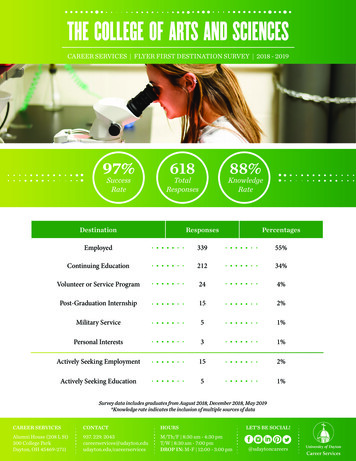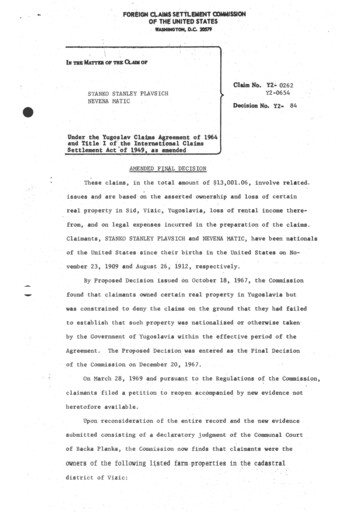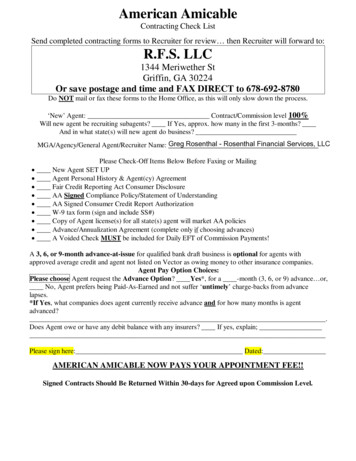
Transcription
HACKERRANKRecruiterCheat Sheet:How to AssessTechnical Roleswww.hackerrank.comw w w.hackerrank.comP.01
INTRODUCTIONHACKERRANKIntroduction Recruiter Cheat Sheet: How to Assess Technical RolesTechnical recruiters have an undeniably challenging job. Not only do they need to source,recruit, and onboard quality technical candidates across a wide variety of roles, but they’realso responsible for helping to craft technical teams that can work well together.Technical teams, perhaps more than any other role in an organization, need to be able towork together seamlessly. After all, their roles are intrinsically linked; they depend on oneanother to successfully churn out company projects.To help hire successful technical candidates means more than findingsomeone with the right skills–it means finding a candidate that also suitsthe needs of your team. And that starts with understanding what makeseach role unique.We created this guide to help you understand exactly how each major technical rolecontributes to the overall productivity of the technical organization, and what makesa standout candidate in each role.In addition, we’ll also list some additional information to keep in mind:In Their Stack:The most popular languages and frameworks for the role,based on data from our 2018 Developer Skills ReportEach role will be broken down into a checklist guide of suggested qualities. Notethat these checklists are designed to act as guidelines—to ensure you’re on the righttrack, it’s best practice to refine your wishlist with the rest of the hiring team.Get in touch with usFor each role, we’ll address 3 key components:Request Demo Expertise:Technical skills necessary for success in the role. Team Compatibility:Specific qualities will allow for successful collaboration in the role. Soft Skills:Non-technical skills that will allow someone to exceed in this role.w w w.hackerrank.comFree TrialOr visit HackerRank.comP.03
TABLE OF CONTENTSTable of Contents 01Linking Key Technical Roles The Technical Team Ecosystem02Assessing Data Roles Data Analyst Data Scientist Data Engineer03Assessing Development RolesRole Levels Junior Developer Senior DeveloperDevelopment Roles Front-End Developer Back-End Developer Full-Stack DeveloperSupport Roles DevOps Specialist04w w w.hackerrank.comResource LibraryHACKERRANK
TECHNICAL ROLESHACKERRANK01 Linking Key Technical Roles Understanding how technical roles differ (and how they’re similar) is one surefire way toensure a good fit. Not only will it help you better understand each respective role, but howeach of them work within the rest of the team––a must-know when screening for team fit.The Technical EcosystemThe technical roles outlined in this guide fall under two broad teams: the data team, andthe software development team. Both have different, but equally important roles in drivingthe organization forward. You can see this illustrated in the example to the left, whichshows how technical teams operate within a SaaS company.It’s worth noting that there’s no one-size-fits-all model for how these teams function in anorganization; every case is unique. To truly understand how your technical teams function,it’s best to sync up with your hiring manager.Technical Org Chart Example: SaaS modelWith this context in mind, we’ll move on to how to assess each team.Prospects& Customersgives feedbackfrom the field todrives productadoption forSales, Marketing,& Customer Servicerelays feedbackfrom the field torelays finishedproduct toData TeamSoftwareDevelopmentTeaminforms decisions requests insights fromDataScientistinformsroadmap ofDataEngineerBack-EndDevelopersharesproduct withFull-StackDeveloperinforms decisions ofrelays refined roadmap toDevOpsProductrequests insights fromw w w.hackerrank.comdevelops software forP.07
DATA ROLESbusiness decisions.Data Scientist: An intermediate between the Data Analyst and Data Engineer,the Data Scientist is tasked with answering key business questions and predictingthem by forecasting future needs and challenges for the organization. They also helpto improve the flow of data across the team. Data Engineer: The foundation of the data organization – they make both Data Analysts’YSTDATAANALTranslates requestsfrom non-technicalstakeholdersMakes businesspredictios usingalgorithms andmachine learningFrequently communicateswith non-technical stakeholdersHelps company makedata-driven decisionsLeverages understandingof analytics stack toperform in their roleResponds to needsand requestsof teammatesTactionable for non-technical company stakeholders, especially when it comes to key Showcases strongbusiness acumenData Analyst: The interpreter between the data world and the non-technical world.They’re generalists that work with a wide variety of data, and help make it clear andISNT Helps key stakeholders(e.g. C-Suite) interpretthe company’s dataUpholds the ethicsof data usageIEHere’s a quick breakdown of how each role functions:Utilizes datafor BI applicationsBridges the gap betweenbusiness developmentand data teamSCData roles help companies become more data-driven through the power of quantitativeevidence. Though their titles may sound similar, their roles are quite different, but stillcomplementary. Each has a different part to play in mobilizing a data-driven organization.TADA02 Assessing Data Roles HACKERRANKUtilizesadvancdmath skillsday to dayDetermines mostvaluable data tocaptureImproves flow of dataFrequently communicateswith technical stakeholdersand Data Scientists’ jobs possible. Focused on software development, they build andmaintain the infrastructure that captures data for the rest of the team to utilize.Constructs & maintainsdata pipelineConstructs data poolsfor team to pull fromDATA ENGINEERw w w.hackerrank.comP.09
HackerRank ChecklistData AnalystHACKERRANKExpertiseBasic statistics and data analysis experienceTrack record of driving effective decision-making through dataHACKERRANKIn Their StackMost common competenciesData Analysts: Languages They KnowFamiliarity with your team’s analytics stackHands-on experience with data visualization100%Can work with the tools and languages utilized by your data team75%Team Compatibility61%50%55%50%Effective verbal, written, and visual communicatorAttentive listener, able to translate non-technical requests48%40%39%25%23%Strong business acumenSelf-motivated, problem-solver, takes initiativeSoft Skills0%PythonJavaJavascriptC TypescriptCPHP18%C#Source: 2018 Developer Skills ReportDisplays innate sense of curiosityCreative, can look at problems from multiple anglesCan think like a C-Suite executiveOpen-minded, provides consistently objective analysisw w w.hackerrank.comP.11
HackerRank ChecklistData ScientistHACKERRANKExpertiseCan bring order to large sets of disorganized datasetsCan maintain and/or train machine learning modelsHACKERRANKIn Their StackMost common competenciesData Scientists: Languages They KnowCapable of working with the tools and languages utilized by your data team100%Team Compatibility88%75%Able to collaborate with all roles of a data teamDetail-oriented, catches data inconsistencies and inefficiencies66%61%50%59%54%Comfortable advocating for their data needsEffective verbal, written, and visual communicatorSoft Skills40%25%20%19%CPHP0%Typescript JavascriptPythonC SwiftJavaBasic business savvyCurious, probing and a bit skepticalSource: 2018 Developer Skills ReportWilling to experiment and iterate on data processesObjective, pragmatic problem-solverStrong storytelling skillsAsks ethical questions around data usagew w w.hackerrank.comP.13
HackerRank ChecklistData EngineerHACKERRANKHACKERRANKIn Their StackMost common competenciesData Engineers: Languages They KnowExpertise100%"Generalist" background in software developmentFamiliar with the needs of a data-driven team75%78%71%Extensive background your data team’s framework(s)Promotes data accessibility, efficiency, and qualityTeam mpathetic to the needs of their teammatesReceptive to constructive feedback and suggestions0%SwiftTypescriptPythonC JavascriptFamiliar with your team's development methodologyCollaborative and team-oriented100%Soft Skills75%Interest in continual self-developmentObjective, not attached to specific solutions50%Focused and self-motivatedEffective technical and non-technical communication 13%12%10%8%8%ReactExpressJSNETCoreASPStrutsSource: 2018 Developer Skills Reportw w w.hackerrank.comP.15
SOFTWARE DEVELOPMENT ROLESHACKERRANK03 Assessing SoftwareDevelopment Roles Though, as a whole, they have a unified goal, a software development team consistsof an eclectic set of specialists, all with their own areas of expertise. More than any othertechnical team, software development teams must constantly be in sync; they’re constantlybuilding on one another’s work to make headway toward a final product. In this category,finding personally and professionally compatible hires is mission critical.DevOpsBuilds & maintainsinfrastructure requiredfor the project to workHere’s how each role contributes to an organization:Development Roles Front-End Developer: The liaison between the technical and non-technical worldFront-End DeveloperBack-End Developerof any organization. They work between the back-end developers and non-technicalExecutes client-side code:makes the projectusable and accessibleExecutes server-side code:builds the foundationof the projectstakeholders in design and product to create the client-facing. Back-End Developer: The architect that builds the base the front-end developer buildson. Tasked with writing server-side code, they’re often utilized to build APIs, and areserverespecially core in facilitating scalable designs. Full-Stack Developer: The generalist that’s capable of working on both the front-endand the back-end. They often have a wide pool of skills and knowledge, but specializein a select few technologies. Often, you’ll find they’re slightly more front-end oriented,user devicesdatabaseor slightly more back-end oriented (rarely both). Note: There’s some disagreement overhow to define “full-stack” in this context. For the full backstory, check out this post.Support Roles DevOps Specialist: They use knowledge of QA, software development, and operationsto help make the software development software as smooth and efficient as possible.They make sure the work the team builds is sustainable in the long run – both from atechnical standpoint, and from an operational one.w w w.hackerrank.comP.17
QUICK TIPHACKERRANKAssessing Junior vs. Senior DevelopersBoth Junior and Senior Developers can hold virtually any specialized development role—but their contributions won’t always be the same. While Senior Developers are generally more seasonedand independent, Junior Developers may need more guidance to do their best work. Make sure you clarify the level of seniority you expect from each candidate in addition to the specialized skills you’re seeking.Here’s what you can expect from each respective seniority level:Junior Developer: This level of developer is newer to the space, with limited experience, butSenior Developer: This level of developer is more seasoned, with a solid technical expertisea good technical foundation. Structure and mentorship from more seasoned developers towithin their stack. They’ve worked on a variety of technical projects over the years, and aredevelop will help develop their skills to their full potential.comfortable self-managing to tackle the problems they’re served.ExpertiseExpertiseCreative problem-solving skillsCan execute the software development cycle end-to-endBasic coding knowledge and fundamentalsPlans for the long-term in their workSome hands-on development experience (e.g. personal projects, internships, and the like)Engages with technical blogs, podcasts, and more to stay currentVersed in basic testing and debugging proceduresAble to lead and manage project with minimal guidanceBasic understanding of your team’s core techReliable, meets committed deadlinesTeam CompatibilityTeam CompatibilityBasic familiarity with your team’s development philosophyExperience working cross-functionally with other departmentsExperience working with a development teamTeam-oriented and willing to seek guidance and collaboration from their peers when neededStrong initiative, proactive problem-solverComfortable mentoring fellow developersHandles constructive criticism wellModest, willing to take input from othersDisplays strong sense of curiositySoft SkillsSoft SkillsDemonstrates accountabilityHunger to expand their technical knowledgeGladly works on both challenging and seemingly menial tasksSelf-starter, requires little oversight to stay motivatedAdvanced technical communications skillsThorough and detail-orientedSolid non-technical communications skillsBasic technical and non-technical communication skillsInvests in continual self-developmentTeam playerw w w.hackerrank.comP.19
HackerRank ChecklistFront-End DeveloperHACKERRANKHACKERRANKIn Their StackMost common competenciesFront-End Developers: Languages They KnowExpertise100%Well versed in HTML, CSS, and JavaScript92%75%Understands a variety of design patterns and new web technologiesHas diversified framework and architecture knowledgeUnderstands UX/UI concepts, including perceived experience and tradeoffs50%49%42%25%37%35%34%29%22%Proficient in front-end testing, debugging, and security0%Exercises the atomic design principleTeam CompatibilityJavascriptJavaCC PythonPHPTypescriptC#Front-End Developers: Frameworks They KnowFamiliar with your team’s development methodology100%Familiar with your team’s front-end framework(s) of choiceProactively discusses use cases with teammatesWorks well with established style guides and coding patternsBasic grasp of teammates’ roles, especially back-end developers75%50%52%50%50%37%25%Team player, easy to work with15%14%13%10%Backbone.jsReactNativeVue.jsRuby onRails0%Soft SkillsExceptional non-technical communication skillsReactNode.jsAngularJSExpressJSSource: 2018 Developer Skills ReportSense of empathy for the end userNaturally detail-orientedInvested in continued self-educationCan produce work up to the brand’s aesthetic standardw w w.hackerrank.comP.21
HackerRank ChecklistBack-End DeveloperHACKERRANKHACKERRANKIn Their StackMost common competenciesBack-End Developers: Languages They KnowExpertiseUnderstands a variety of software design patterns and frameworksDelivers high quality, scalable server-side codeQuick study, easily picks up new techKnows standards and best practices within their tech stackStrong architectural skillsTeam Compatibility100%75%60%50%Familiar with team’s existing development methodologyContributes to both code and design reviews58%52%47%25%30%29%#PHP0%JavascriptStack match for your teamWorks well with both technical and non-technical teammates80%CCJavaC PythonBack-End Developers: Frameworks They Know100%Keeps detailed design docs for team reference75%Soft Skills50%Flexible, objective project-solverAccountable, owns their hits and misses39%25%22%Gladly tackles problems of all shapes and sizesRobust technical communication skillsStrong non-technical communication skillsw w e: 2018 Developer Skills ReportP.23
HackerRank ChecklistFull-Stack DeveloperHACKERRANKNOTE: The role of the Full-Stack Developer is a hotly debated topic. For a primer,check out this blog post.ExpertiseHACKERRANKIn Their StackMost common competenciesFull-Stack Developers: Languages They Know100%89%Self-sufficient: can build an MVP independently75%Stack match for your teamComfortable thinking at a high technical level71%57%50%50%Understands tech beyond their stack of expertiseDrives best practices across the team’s tech stack47%40%40%25%40%Team CompatibilityKnows your team’s development style (e.g. agile, waterfall, and so on)0%CCJavascriptJavaC Python#PHPRubyKnowledgeable and willing mentorStrong technical communication skillsEasygoing, team playerFull-Stack Developers: Frameworks They Know100%Humble in their work: knows what they don’t know75%Soft SkillsLifelong learner: prioritizes self-education50%51%48%Creative, motivated problem-solverSelf-starting: manages themselves well34%25%31%29%22%Global thinker: mindful of technical and non-technical context of their workObjective: makes decisions around what a project needs (not what they prefer)Strong product owner: passionate about the productw w ringASP18%NETCore16%DjangoSource: 2018 Developer Skills ReportP.25
HackerRank ChecklistDevOps SpecialistHACKERRANKExpertiseHas experience in a related technical fieldHACKERRANKIn Their StackMost common competenciesDevOps Specialists: Languages They Know100%Track record of successful system monitoring and reportingAdaptable, comfortable with learning new technologies on the fly75%74%67%Employs a “work smarter, not harder” attitude within their workComfortable overseeing maintenance of big data61%50%55%50%Experience building server environmentsComfortably with production level system and network monitoringTeam Compatibility34%25%29%22%0%SwiftPythonTypescriptC JavascriptJavaCGoFamiliar with your team’s development methodologyCapable of advocating for the long-term needs of the systemCollaborative and team-orientedDevOps Specialists: Frameworks They Know100%Composed and organized in all scenariosStrong leadership qualitiesSoft Skills75%50%Self-directed, timely, and proactiveWilling to work on the “behind the scenes” side of development25%24%21%Strong interpersonal communication skillsEager sense of curiosity, with strong problem-solving skillsStrategic decision-makerw w w.hackerrank.com0%Node.jsAngularJS20%DjangoSource: 2018 Developer Skills Report15%15%14%13%11%SpringASPExpressJSRuby onRailsNETCoreP.27
RESOURCE LIBRARYCONCLUSION04 Resource Library Conclusion If you’re looking to dive even deeper into any of the roles we covered, check outsome of the resources below. They’ll give you an even more in-depth understandingof what goes into each role:Though each role is unique, a technical team is more than the sum of its parts. There’sno doubt that expertise is the most important prerequisite for any candidate––but teamcompatibility and relevant soft skills will help ensure they’re a long term fit. By understanding how each role functions, and how these roles work together as a unit, you’reone step closer to finding the right fit for your team.Tech News & Views HackerNews: Developer focused tech news and opinions Slashdot: Skim-friendly tech news snippets HackerNoon: Tech news and trends, covered by 7,000 contributorsHACKERRANKWe’d encourage you to use this guide not only in your sourcing, but also when meetingwith hiring managers. Each team is unique, and consequently, so is each role. Aligningon each point will help to streamline the hiring process down the line—and will makesure you can snag the perfect candidate when you do find them.Developer Discussion /r/devops: User submitted thoughts and discussion on DevOps as a discipline /r/programming: One of the biggest developer subreddits, great for findingtrending topics /r/webdev: High-level discussions amongst developers of multiple disciplines Quora: Software Engineering: Loads of job-focused questions, asked by andanswered by developersOther Resources 2018 Tech Recruiting Report: The state of hiring alignment, as told by hiringmanagers and recruiters Want to learn more?Request DemoFree TrialOr visit HackerRank.com2018 Developer Skills Report: Developer trends for 2018, based on input fromover 39,000 developersw w w.hackerrank.comP.29
Match Every Developer to the Right JobHackerRank is a technology hiring platform that is the standardfor assessing developer skills for over 1,000 companies around the world.By enabling tech recruiters and hiring managers to evaluate talent objectivelyat every stage of the recruiting process, HackerRank helps companies hireskilled developers and innovate rank.com 1-415-900-4023 91-888-081-1222 44-208-004-0258www.hackerrank.com
Recruiter Cheat Sheet: How to Assess Technical Roles To help hire successful technical candidates means more than finding someone with the right skills-it means finding a candidate that also suits the needs of your team. And that starts with understanding what makes each role unique. Expertise:









